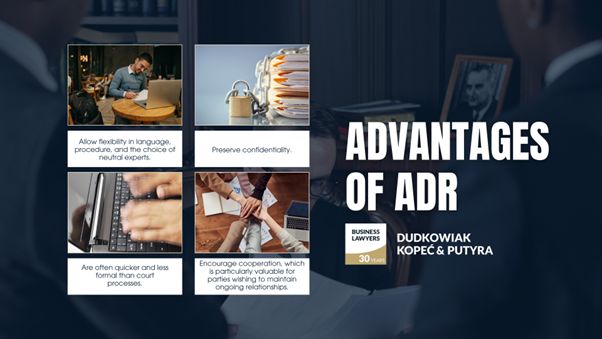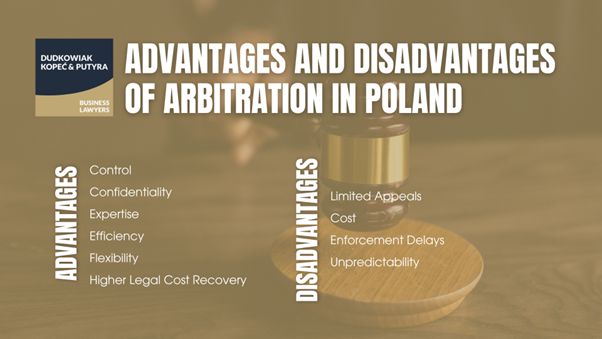- within Corporate/Commercial Law, Employment and HR and Tax topic(s)
- in United States
- with readers working within the Accounting & Consultancy and Media & Information industries

Types of ADR in Poland
Alternative Dispute Resolution (ADR) methods, including mediation, conciliation, and arbitration, have become increasingly popular in Poland. They offer a faster, more flexible, and often less adversarial approach compared to traditional litigation.
Mediation
Mediation is a voluntary process where a neutral mediator facilitates negotiations between parties to reach a mutually acceptable solution. Key features include:
- Confidentiality: Mediation discussions remain private, regardless of the outcome.
- Flexibility: Mediation can occur before or during litigation.
- Binding Settlements: Agreements reached in mediation, once approved by a court, carry the same legal force as a court judgment.
Mediators focus on fostering cooperation and addressing the parties' goals rather than assigning blame.
Conciliation
Conciliation is similar to mediation, but differs in the mediator's role:
- The conciliator actively proposes solutions based on an impartial assessment of the parties' positions.
- The proposal can be accepted or rejected by the parties.
- Like mediation, settlements reached through conciliation and approved by courts are legally binding.
Arbitration
Arbitration offers a formal alternative to court litigation, where disputes are resolved by an arbitrator or a panel of arbitrators chosen by the parties. Key aspects include:
- Arbitration Clauses: Disputes can be referred to arbitration through written agreements made before or after a dispute arises.
- Enforceability: Arbitral awards are legally binding and can be enforced following court approval.
- Single-Instance Proceedings: Typically, arbitration involves no appeals unless explicitly agreed upon by the parties.
Advantages of ADR
ADR methods are attractive because they:
- Preserve confidentiality.
- Allow flexibility in language, procedure, and the choice of neutral experts.
- Are often quicker and less formal than court processes.
- Encourage cooperation, which is particularly valuable for parties wishing to maintain ongoing relationships.

Arbitration Proceedings in Poland - Overview
Arbitration involves resolving disputes outside courts through an agreed tribunal. Characteristics include:
- Voluntary Nature: Parties must agree to arbitration through clauses or agreements.
- Flexibility: Parties can determine the language, venue, and procedural rules of the arbitration.
- Binding Decisions: Arbitration awards are final and enforceable after court recognition.
Types of Arbitrable Disputes
- Disputes over property rights (e.g., contractual payments, corporate conflicts).
- Certain non-economic disputes that can be legally settled by agreement.
Key Steps in Arbitration
- Initiation: Begins with a summons for arbitration or filing of a claim, supported by the arbitration clause.
- Selection of Arbitrators: Parties select arbitrators, often experts in relevant fields.
- Organizational Hearing: Procedural details, such as schedules and evidence submission, are determined.
- Hearings and Pleadings: The dispute is presented, often in one or two hearings.
- Award Issuance: Arbitrators deliver a decision, potentially including settlement terms if agreed by the parties.
Costs of Arbitration in Poland
Arbitration costs include:
- Registration and Arbitration Fees: Calculated based on the claim value and the tribunal's rules.
- Legal Fees: Reimbursement depends on the parties' agreements or tribunal rules.
- While arbitration fees are higher than court fees for small claims, they may be cost-effective for high-value disputes due to the streamlined process.

Recognition and Enforcement of Arbitral Awards in Poland
Arbitral awards must be recognized by Polish courts to be enforceable. The process requires:
- Submission of the arbitral award and arbitration agreement.
- Compliance with legal standards for domestic or international recognition, such as under the New York Convention.
Courts can refuse recognition if:
- The dispute is non-arbitrable under Polish law.
- Procedural flaws, such as lack of proper notice or jurisdictional issues, are evident.
Advantages and Disadvantages of Arbitration in Poland
Advantages
- Control: Parties shape procedural rules, timelines, and arbitrator selection.
- Confidentiality: Disputes and outcomes remain private.
- Expertise: Arbitrators are often industry specialists.
- Efficiency: Shorter duration and less formal procedures.
- Flexibility: Choice of language and venue.
- Higher Legal Cost Recovery: Reimbursement is closer to actual costs incurred.
Disadvantages
- Limited Appeals: Arbitration decisions are rarely subject to review.
- Cost: Initial costs can be higher than court fees, especially for small claims.
- Enforcement Delays: Recognition of arbitral awards by courts can prolong resolution.
- Unpredictability: Awards may be based on equity, leading to less certainty.

Recommendations for ADR Usage
ADR offers significant benefits, but careful drafting of arbitration or mediation clauses is crucial. Clauses should specify the scope of disputes, applicable law, and procedural rules and provide clear terms for arbitrator selection, costs, and appeals (if any).
The content of this article is intended to provide a general guide to the subject matter. Specialist advice should be sought about your specific circumstances.



